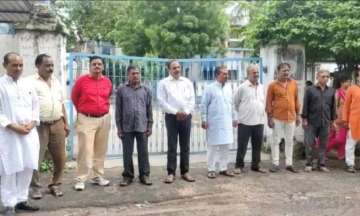Bilkis Bano case: PM, BJP face fire on convicts release; Gujarat govt defends move | Top points
Bilkis Bano was 21 years old and five months pregnant when she was gang raped while fleeing the violence that broke out post the Sabarmati train burning incident in Godhra. Seven members of her family were killed during the 2002 post-Godhra riots.

Bilkis Bano case: 11 people convicted for rape and murder in the Bilkis Bano case of the 2002 post-Godhra riots were released on August 15 after the Gujarat government allowed their release under its remission policy. The release of the convicts led to the ruling BJP facing the Opposition's fire.
Bilkis Bano was 21 years old and five months pregnant when she was gang raped while fleeing the violence that broke out post the Sabarmati train burning incident in Godhra. Seven members of her family were killed during the 2002 post-Godhra riots.
After their release on completion of more than 15 years in jail, the convicts, who were also charged with killing the pregnant Muslim woman’s three-year-old daughter, were welcomed with sweets and garlands outside the prison.
A special CBI court in Mumbai in 2008 sentenced the 11 accused to life imprisonment on the charge of gang rape and murder of seven members of Bilkis Bano's family. Their conviction
was later upheld by the Bombay High Court.
What Bano's husband said
While the convicts, sentenced to life imprisonment, walked out of the Godhra sub-jail on August 15 after the Gujarat government allowed their release under its remission policy, spoke about starting a new life, Bilkis Bano's husband Yakub Rasul expressed surprise over the relief granted to them.
“We were surprised to know that the convicts have been released,” Bilkis Bano's husband Yakub Rasul told PTI.
"We don’t know when the convicts processed their application and which ruling the state government took into consideration. We never received any kind of notice,” Rasul said.
Rasul said the Gujarat government had paid the family a compensation of Rs 50 lakh as directed by the Supreme Court, but is yet to provide a job or a house as directed by the apex court.
Rasul said he lives virtually in hiding with his wife and five sons, the eldest one 20 years old.
The convicts' remarks
Radheshyam Shah, the convict whose plea for premature release paved the way for all the 11 life sentence convicts to walk out of jail, said he feels happy to be released.
"The Gujarat government has released us as per the order of the Supreme Court. I feel glad to be out as I will be able to meet my family members and begin a new life," he said.
Opposition's fire
In New Delhi, Opposition parties hit out at Prime Minister Narendra Modi over the release of the convicts within hours of his praise for "Nari Shakti" in the Independence Day speech and alleged this is the "real face" of 'New India" under the BJP.
They said the remission for the convicts, serving life imprisonment for the gang rape of a pregnant Bilkis Bano and murder of seven of her family members, was a violation of the Centre's guidelines and demanded withdrawal of the order.
Congress spokesperson Pawan Khera said Modi should tell the country if he himself believed in his words when he spoke about the safety, respect and empowerment of women.
In a tweet, the CPI(M) condemned the release of the convicts, saying "This is the real face of New India -- convicted killers and rapists released" and activist Teesta Setalvad "who fought for justice was jailed".
Trinamool Congress spokesperson Saket Gokhale said Bilkis Bano was "raped in the 2002 Gujarat pogrom and her entire family was murdered and buried in a mass grave".
"Gujarat govt has now released all 11 monsters who were convicted of this heinous crime. Where's the outrage by people & the Noida media? Not even a whimper," he tweeted.
Bahujan Samaj Party MP Danish Ali also referred to the prime minister's remarks and said the release of the 11 convicts has exposed the huge gap between words and the spirit of justice.
Gujarat's defence
Gujarat governemnt defended the move, saying the convicts were released as per the remission policy prevalent in the state at the time of their conviction in 2008 and rejected claims of contravention of the Centre's guidelines in the matter.
"These 11 persons were convicted by a special court in Mumbai in 2008. At the time of conviction, Gujarat was following a remission policy which came into effect in 1992. When the matter reached the Supreme Court, it directed us to decide about the release under the 1992 policy, because that was prevalent when conviction came in 2008," Additional Chief Secretary, Home, Raj Kumar, told PTI in Ahmedabad.
Gujarat adopted a new and revised remission policy for prisoners in 2014. In that policy, which is currently in effect, there are detailed guidelines about categories of convicts who can or can not be given relief, said the senior bureaucrat.
"Since the conviction took place in 2008, the SC directed us to consider this case under the 1992 policy, which was in effect in 2008. That policy did not have any specific clarity as to who can be given remission and who can not. That policy was not that detailed in comparison to the 2014 policy," said the IAS officer.
Lawyers also said the SC order directing the Gujarat government to consider the remission of sentence as per the July 1992 policy paved the way for the premature release of the convicts. As per the current policy, a person convicted for both gang rape and murder can not be released prematurely, but the 1992 policy had no such bar, a lawyer said.
(PTI inputs)